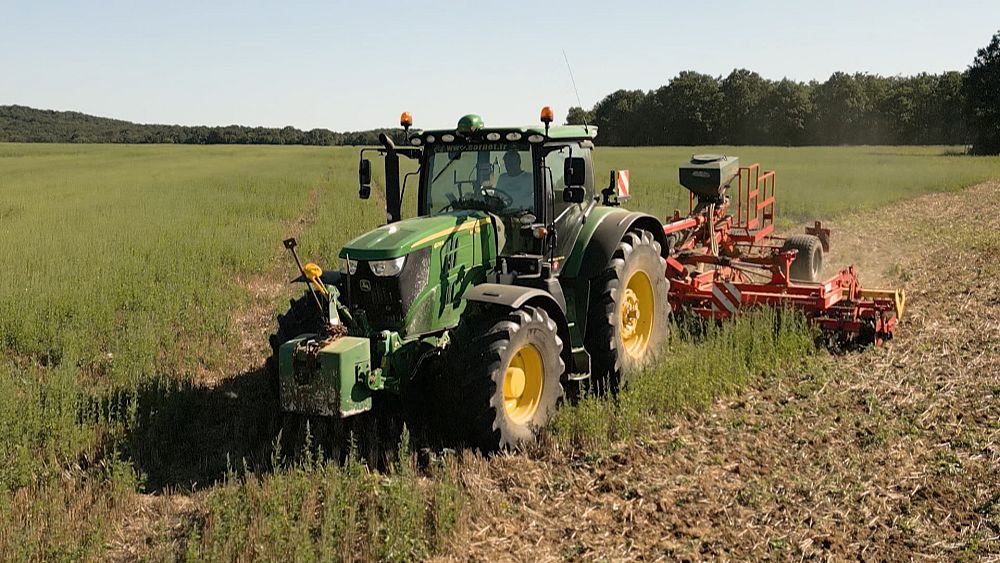
How can we change our farming practices to restore nature, while being able to guarantee our food security? That’s what we’ll be looking at in this episode of Road to Green.
Farming practices in Normandy, in the north of France, still have high levels of chemical pesticides, herbicides, and fertilizers. Europe’s objective is to halve their use by 2030.
Conventional farmers like Emmanuel Drique, have successfully made the transition from intensive farming and has turned to agroecology.
“Traditionally, we grow wheat after flax, but I don’t do that, I grow rapeseed. It’s a plant that will capture nitrogen in the autumn, so it does not leak into the water table. This way I recover nitrogen for my rapeseed, so I don’t have to apply as much chemical nitrogen myself. It’s a win-win.
I started out with a very intensive system. It was based on a lot of fertilisers and chemicals, with technical results that weren’t necessarily up to scratch. So I asked myself a lot of questions about how we could do things differently. But what is going to force us to move much faster is the climate crisis, the loss of biodiversity, and the third element is the energy crisis.”
Changing the way we farm is a priority for Europe, but it is complicated.
A major European framework law for sustainable food systems should soon place nature restoration at the heart of all agricultural policies. Bertrand Omon is an agronomist and he says public authorities have the responsibility to immediately encourage the transition to other models.
“The economic demonstration we’ve been doing with this group for the past 10 years is that they’re not losing money and that the gain is in the common goods. But for other people, since there’s no economic surplus, they don’t make the change. In any case, this way of producing cannot last, because we can’t renew chemical active ingredients at the speed that would be necessary given the emergence of inefficiencies and resistances”.
Some phytosanitary products are not always effective and will become less so, if we improve resilience and biodiversity in nature. Christian Huyghue is also an agronomist.
“You only need pesticides if you have disease pressure. And so if you have more biological regulation, you’ll need fewer pesticides because you’ll have more natural protection.”
The positive effects of restoring ecosystems are very much in evidence on the land of Charles Hervé-Gruyer, a farmer and author. This French permaculture pioneer passes on the knowledge he has acquired on his small organic farm, Ferme du Bec Hellouin which is inspired by the complexity of nature.
“In fact, there are what we call ecosystem services. These are all the services that nature provides free of charge and that enable us humans to live. These include the creation of fertility and the pollination of plants, as well as the self-regulation of diseases and pests.
More than ten scientific research programs have been carried out on this farm. The first major study lasted four years and showed that we produced an average of 55 euros worth of vegetables per square metre grown entirely by hand. That’s over 10 times more than organic market gardening with a tractor. The fertility of plots that are intensively gardened increases very quickly and the other good news is that it frees up nine-tenths of the land for planting trees, digging ponds, and raising animals… So the same amount of land is both much more natural and much more productive !”
However, Charles’ farm remains an exception. More than half the land in Europe is in poor condition. That’s why a major European law on soil monitoring was proposed this summer.
To understand what’s at stake, Road To Green went to Northern Europe.
An environmental protection association has a workshop on a pilot farm, where the issues of reducing pollution, protecting the climate, and restoring biodiversity are intimately linked.
Saara Kankaanrinta and Ilkka Herlin are the owners of Qvidja Farm, and the co-founders of the Baltic Sea Action Group. They work with scientists at their farm to regenerate land damaged by intensive farming. One of the priorities is to protect the Baltic Sea. Nutrient discharges have severely depleted its oxygen content.
“It’s already one of the most polluted seas in the world. That means that there is a lot of excess of nitrogen and phosphorus in the sea. And that comes from agriculture and forestry”. Says Saara.
Ilkka adds : “If you want to prevent the run-offs from the fields, you have to have to proper soil structure. And how do you make the soil structure? You have to have as much carbon in the soil as it’s possible, to build the ecosystems back to the fields like it was decades ago. ”
To rebuild ecosystems, we also really need to limit land disturbance, such as intensive ploughing.
Tuomas Mattila, is a Regenerative Farmer.
“If the soil is not in a good shape, you lose a lot of soil and with the soil, the nutrients. And you would like to use the nutrients on the field to grow food. So if you lose this, you have to put more on “.
The other good news is that life is carbon. So the more life there is underground, the less carbon there is in the atmosphere. These technologies make it possible to measure its presence in the soil.